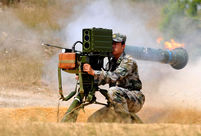 Sichuan money wall for dividend payment
Sichuan money wall for dividend payment Li Na crashes Belinda Bencic in 2nd round at Australian Open
Li Na crashes Belinda Bencic in 2nd round at Australian Open
 Shocking moments when PLA's weapons open fire
Shocking moments when PLA's weapons open fire Famous Lanzhou beef noodles
Famous Lanzhou beef noodles Armed Police hold anti-terrorism drill in SE China's Xiamen
Armed Police hold anti-terrorism drill in SE China's Xiamen Harbin Int'l Ice and Snow Festival opens
Harbin Int'l Ice and Snow Festival opens 'Jin' named the word of the year by cross-strait netizens
'Jin' named the word of the year by cross-strait netizens Chinese scientific expedition goes to build new Antarctica station
Chinese scientific expedition goes to build new Antarctica station
 Chinese naval escort fleet conducts replenishment in Indian Ocean
Chinese naval escort fleet conducts replenishment in Indian OceanAttackers must be shown no mercy, declares top regional official
The Xinjiang Uygur autonomous region plans to double the budget for its public security bureau to fight terrorism this year, with a top regional official vowing no mercy for terrorists.
Political advisers and experts say more assistance for young people and the unemployed in rural areas will help to prevent them from being lured by religious terrorists.
The region's public security bureau will receive 2 million yuan ($330,420) this year to combat terrorism, according to the draft of the government's budget report released at the annual session of Xinjiang Regional People's Congress, which started on Thursday.
This amount will be part of 6.1 billion yuan — a 24 percent rise year-on-year — earmarked for all public security forces, including armed police.
Despites a series of terrorist attacks last year, security in the region remains largely stable, as authorities have stepped up their efforts in key areas, Nur Bekri, chairman of the Xinjiang regional government, told lawmakers in his work report, delivered in the Uygur language.
Such measures will be improved this year, especially at the grassroots level, he said.
"We must constantly strike hard against violent terrorism, showing no mercy, in accordance with the law, and maintaining a highhanded posture.
"The government is determined to curb the spread of religious extremism as well as prevent severe violent terrorist attacks and mass incidents from happening," he said.
Nur added that preventing and eliminating religious extremism has become an important task for the region as it strives to maintain long-term stability.
Most terrorist attacks in 2013 took place in townships or villages where local people have emerged as extremely vulnerable targets for religious extremists.
Many of the attacks involved suicide and targeted local authorities, including police, said Ma Pinyan, a senior anti-terrorism researcher and deputy director of the ethnic and religious studies center at Xinjiang Academy of Social Sciences.
Ma said the spread of religious extremism has led to more attacks, as police investigations showed that most of the attackers were recruited and trained by extremists. Jihadist flags were also found at crime scenes or at the extremists' hideouts.
Gulistan Azez, a member of the Xinjiang Committee of the Chinese People's Political Consultative Conference and deputy head of Yuepuhu township in Xinjiang's Kashgar prefecture, said, "High school graduates who are under 28 and unemployed are much more easily manipulated by religious extremism.
"To reduce such a possibility, we provide vocational training and assist them to find jobs. We have to help young people before they are targeted by religious extremism."
Abudukadeer Shawut, a political adviser and imam of China's biggest mosque, Id Kah in the city of Kashgar, said: "Religious extremists often choose young people with little education and no jobs as their targets and use money to lure them.
"They often recruit their forces in villages where the education level is low. We must let people, especially young people, know what the real religion is and prevent them from falling into this trap," he said.
But people shouldn't confuse religious extremists with those who are not satisfied with society, Abudukadeer said.
Some people may have negative attitudes toward local government officials or police officers who are rude. In extreme cases, those people may even turn violent, but they shouldn't be categorized as religious extremists, he said.
On April 23, 15 people, including six police officers, were killed in a terrorist attack in Selibuya, a township in Kashgar prefecture.
Police found that members of a terrorist cell formed in Selibuya in September 2012 regularly attended meetings where they viewed and listened to materials relating to religious extremism and terrorism.
They also underwent physical training and learned how to kill by watching footage of terrorist attacks. Police said they found knives, combat training material, illegal extreme religious pamphlets and three jihadist flags after the attack.
Twenty-four people, including two police officers, were killed by a terrorist gang in Lukqun, a township in Turpan prefecture, on June 26.
Xinjiang police said the suspected leader of the gang arranged for members to watch videos promoting religious extremism. Before the attack, two extremists from Kuqa, a county in southern Xinjiang, called on the gang to carry out a jihad, or holy war, police said.
 In photos: Ten 'tuhao' devices in 2013
In photos: Ten 'tuhao' devices in 2013 College students saved from an ice hole by brave citizens
College students saved from an ice hole by brave citizens Gallery: Top 10 box office hits in 2013
Gallery: Top 10 box office hits in 2013 Beautiful churches around the world
Beautiful churches around the world Yang Mi, Hawick Lau hold wedding in Bali
Yang Mi, Hawick Lau hold wedding in Bali 'Phubbing' people seen everywhere
'Phubbing' people seen everywhere World's biggest snack shop in China
World's biggest snack shop in China Shocking moments when PLA's weapons open fire
Shocking moments when PLA's weapons open fire World's fastest train CRH380A assembled in E China
World's fastest train CRH380A assembled in E China Mechanized infantry brigade in tactical drill
Mechanized infantry brigade in tactical drill Sichuan money wall for dividend payment
Sichuan money wall for dividend payment 40-day spring travel rush starts on Jan. 16
40-day spring travel rush starts on Jan. 16 Charity exhibition raises money for panda protection
Charity exhibition raises money for panda protection China's national pole dancing to play 'The Butterfly Love'
China's national pole dancing to play 'The Butterfly Love'  Weekly sports photos
Weekly sports photosDay|Week|Month